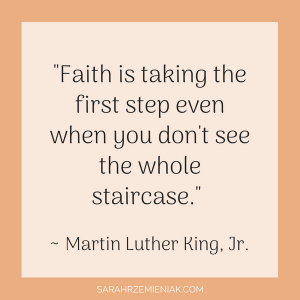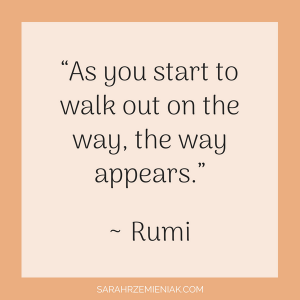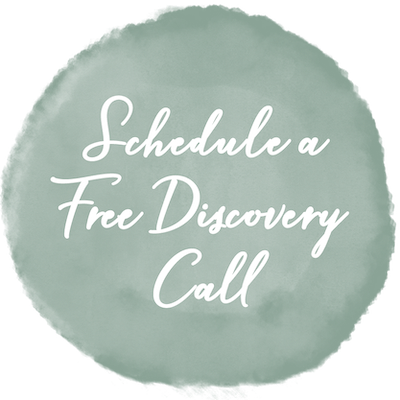This piece was originally posted in The Looking Glass Foundation blog.
My eating disorder recovery journey was anything but linear, as I’m sure so many of you can relate to. There were so many steps forward, slips backward, plateaus and relapses.
When I look back on my journey though, one thing that stands out for me as being so helpful was focusing ahead only as far as I could visualize. I would then take steps forward that weren’t so small that they barely challenged me and weren’t so big that I felt overwhelmed to the point of thinking I should give up. For me, this made such a difference in my recovery.
Aiming for ‘recovered’ did not happen for me until much later in my journey, even though I knew it was possible and had seen many others who were recovered.
What I hoped for during most of my eating disorder recovery journey was a bit more freedom, a bit less exhaustion, a bit more of a life - but not too much, not at first.
 Throughout my recovery my ambivalence was so ever-present, as was my doubt that I could ever be fully recovered. I felt confused about what ‘recovered’ even meant for me, and so it felt very hard to make ‘recovered’ my day-to-day commitment.
Throughout my recovery my ambivalence was so ever-present, as was my doubt that I could ever be fully recovered. I felt confused about what ‘recovered’ even meant for me, and so it felt very hard to make ‘recovered’ my day-to-day commitment.
However, what I often could do was commit to taking challenging yet doable steps, one at a time to make life just a bit better, a bit less rigid, and a bit more free.
Over time, these steps added up and I felt ready for so much more.
It reminded me of what Carolyn Costin and Gwen Schubert Grabb describe in their book 8 Keys to Recovery from an Eating Disorder. These small, gradual steps brought forward my inner Healthy Self and gave it a taste of being in control in a way that didn’t cause too much resistance or a desire to give up. These repeated small steps gave me the desire to set bigger goals, until my goal finally became, “I want to be fully recovered.”
Everyone’s recovery journey is unique, and what constitutes manageable steps will be completely different for everyone.
For some, the desire to become fully recovered will feel right from the start. For others, it may take some time. Furthermore, if your immediate health requires it, large steps may be required of you before you truly feel ready for them. Each of our journeys is so unique, yet similar in so many ways.
 The most important thing is to never give up hope that things can get better and change in surprising ways with enough time and gradual steps along the way. And to also remember that slips back, plateaus and relapses are the rule, not the exception, on the eating disorder recovery journey.
The most important thing is to never give up hope that things can get better and change in surprising ways with enough time and gradual steps along the way. And to also remember that slips back, plateaus and relapses are the rule, not the exception, on the eating disorder recovery journey.
Reach out for support from those who make you feel safe and cared for, as hard as this can be. Read stories and meet people who have recovered - it’s amazing what can resonate and inspire hope.

Often, my recovery journey felt like climbing a forested, misty mountain full of challenges to overcome. I couldn’t clearly see the summit until I was very close to it, and so I just took the journey one switchback at a time.
However, with each switchback solidly behind me, life was that much more free and hopeful, until finally the summit was in my sight, and then there.
Each of our mountains is unique, and each of our journeys has different and beautiful wonders, lessons and opportunities for growth along the way.
If you can’t see the summit, try your best to not give up, and don’t feel bad if aiming for the summit feels like an unrealistic or unfathomable goal right now. It doesn’t mean you won’t make it there.
Focus on where you are now, and on the next challenging but manageable step you feel ready to take. Small steps and gradual changes truly do add up over time.
Journaling Prompts:
- Does it feel difficult to imagine the summit of being fully recovered right now? If so, don’t worry. It can often feel impossible to imagine that far ahead to something that feels so mysterious and shrouded in mist and the unknown.
- How does thinking about setting more tangible goals, that are challenging but manageable, make you feel?
- What is one challenging but manageable goal you can commit to starting now?
P.S. For more information on the topic of recovering vs. recovered, these are some readings and videos that explore these distinctions and definitions further which you may find helpful:
- Recovered vs. Recovering by Carolyn Costin (article)
- The 10 Phases of Eating Disorder Recovery by Kaela Scott (blog post)
- Recovered, In Recovery and Recovering by Carolyn Costin (video)
With so much compassion and optimism for your journey,

Support For Your Journey
If you feel you could use more support on your eating disorder recovery journey I would love to connect with you. Contact me to book a free video discovery call so that we can explore if working together would be a good fit. I would love to hear from you.











